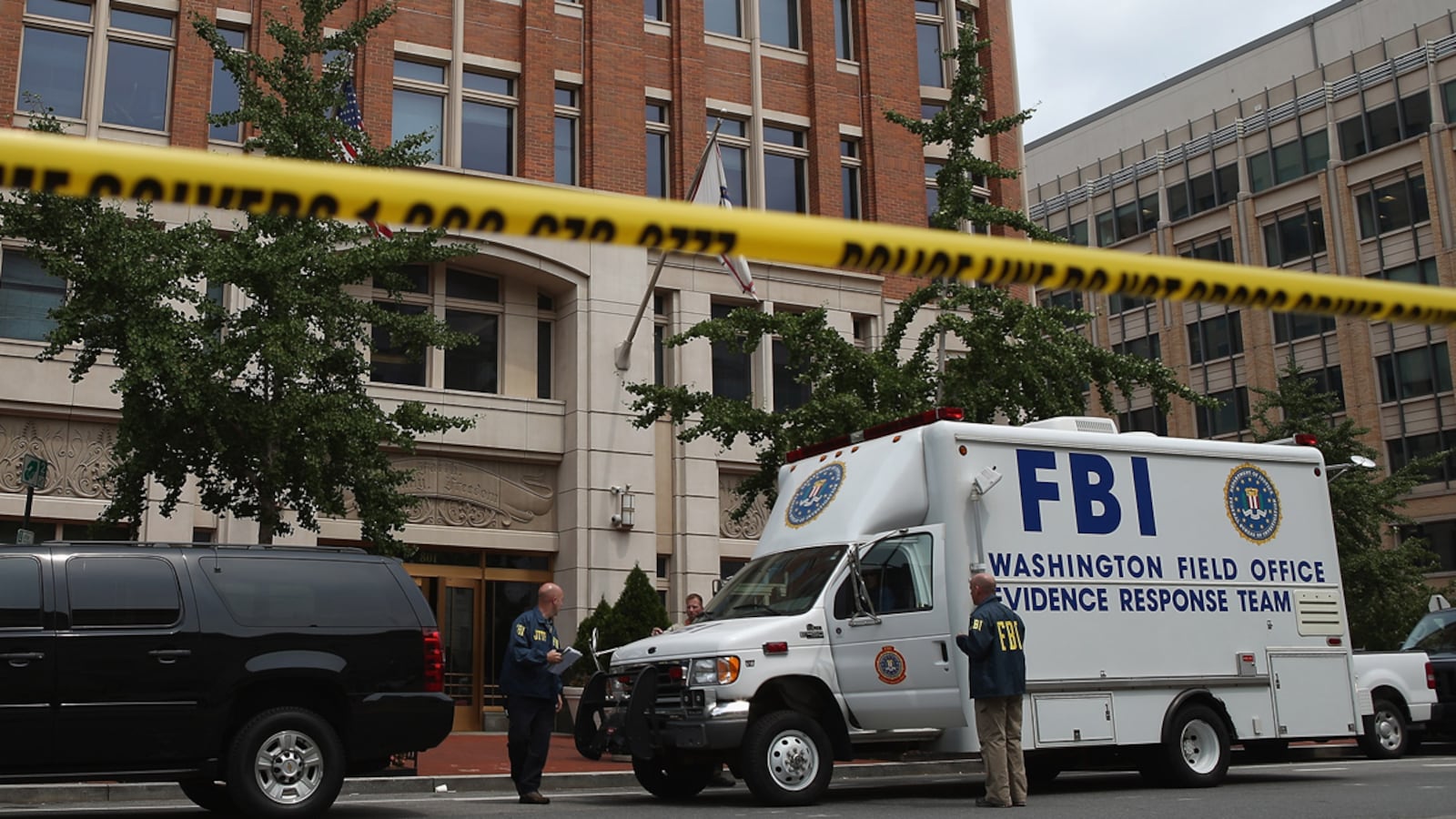On Thursday afternoon, Family Research Council President Tony Perkins reiterated a narrative that’s been building among conservative groups in the wake of this week’s politically motivated shooting of a security guard employed by the organization: that liberal groups, in particular the Southern Poverty Law Center, were responsible for the shooting because they have labeled the FRC a “hate group.” Positioning himself in a role of dispassionate debater of public policy, Perkins expressed his “appreciation to the groups and organizations that we do not agree with on many public-policy issues who have also expressed their outrage for what took place.” Then, he insisted that the SPLC’s use of the “hate group” label is “reckless,” and said the civil-rights organization had “given a license to shoot an unarmed man.”
“The SPLC has listed the FRC as a hate group since 2010 because it has knowingly spread false and denigrating propaganda about LGBT people—not, as some claim, because it opposes same-sex marriage,” SPLC senior fellow Mark Potok responded in a statement posted his group’s Hatewatch blog. “Perkins and his allies, seeing an opportunity to score points, are using the attack on their offices to pose a false equivalency between the SPLC’s criticisms of the FRC and the FRC’s criticisms of LGBT people.” The SPLC has stated that believing the Bible condemns homosexuality does not make an organization a hate group.
Conservatives were outraged when the SPLC revised its list of hate groups in 2010, adding the Family Research Council and the American Family Association. The shooting on Wednesday brought the ire flooding back, as conservative journalists and bloggers insisted that the SPLC is the true hate group. Maggie Gallagher, the president of the National Organization for Marriage, linked to a 2010 article that quoted a SPLC research director saying her group sees no difference between anti-gay evangelical groups and white supremacists. “Trying to lump Tony Perkins with the guy who shot people at the Sikh temple is morally bankrupt on its face,” Gallagher wrote.
William Jacobson, a professor at Cornell Law School and author of the conservative blog Legal Insurrection, has attacked the SPLC for, in his view, expanding its focus to include more mainstream conservative political groups as well as racist groups. On Wednesday, Jacobson repeated the implication that the SPLC’s designation of the Family Research Council as a hate group is based on FRC’s opposition to gay marriage. “SPLC gave cover to those who use the ‘hate speech’ and ‘hate group’ labels to shut down political and religious speech, and now it has spiraled out of control,” Jacobson wrote.
There is no doubt that Perkins, the Family Research Council, and other conservatives are deploying the shooting to score political points. But they have raised a substantive concern that defies a simple answer, especially in a situation fraught with political and religious tension: which organizations can fairly be called hate groups? Can a word like “hate,” packed with visceral connotations, be part of a civilized debate about a public-policy issue?

The SPLC’s definition of hate speech does not require an explicit incitement to violence. According to the group’s website, a hate group must have “beliefs or practices that attack or malign an entire class of people, typically for their immutable characteristics.” Being named as a hate group “does not imply a group advocates or engages in violence or other criminal activity.”
Disagreement with the SPLC’s definition of “hate” permeates the conservative criticism of the group, such as Gallagher’s distaste that the SPLC does not distinguish between groups like the FRC and white supremacists. Concern about that definition does not come exclusively from right-wing blogs; there is disagreement among experts who study extremist activity over what exactly makes a hate group.
Brian Levin, director of the Center for the Study of Hate & Extremism at California State University, said there was a “fine line” where a political group’s promotion of bigotry becomes hateful. He said that violent events often lead to “hate” terminology being used as “political battering rams" against mainstream groups, when the reality is much more complicated. Levin, who formerly worked for the SPLC, said he believed their definition of hate was defensible, but that his center does not consider FRC a hate group.
“[FRC’s] use of pseudoscience and wild allegations about gays certainly brings them up to the line, and a reasonable person could make that argument,” he said. “I do believe they promote bigotry; however for me, it has to be something more—not just falsehoods, but conspiratorial falsehoods, some kind of violence, and some kind of goal of destroying institutions of liberal democracy.” FRC, he added, works through the political system rather than encouraging its members to subvert it. “They’re in D.C., they’re a lobbying group.”
It seems like common sense that a lobbying group with offices in Washington is in a different category than racist groups like the Aryan Nations, which federal law-enforcement officials consider a domestic terrorist network. Though all hate groups are not equal, it remains difficult to draw a clear line where propaganda that demonizes an entire class of people—gays, African Americans, Jews, Muslims, immigrants—becomes hate. White supremacists traffic in racist pseudoscience and skewed studies designed to confirm to their beliefs. A majority of those populating Internet forums like Stormfront are not personally violent, but their online postings leave no doubt that they are hateful.
Similarly, evangelical “pro-family” groups like the FRC and the AFA promote both skewed and long-discredited studies on sexual orientation to support a narrative that homosexuality is a threat to society. One only needs to take a brief glance at the Twitter feed of Bryan Fischer, the issues analysis director for the AFA, to confirm that he is overcome with hate for a wide variety of groups he perceives as threats to his religious and political views. While statements from the FRC’s leaders are significantly less vitriolic than Fischer’s rantings, they contain many of the same debunked facts and discredited narratives. Their factual failings and hostile rhetoric is so extreme that even Albert Mohler, the president of the deeply conservative Southern Baptist Convention, characterized evangelicals’ reaction to homosexuality as “rooted in ignorance and fear” and “consigning homosexuals to a theological and moral category all their own.”
Ignorance and bigotry, as well as sincere religious belief, can lead to bad science. But do bad facts equal hate? Reasonable people can disagree about that, but what’s clear is that the definition of “hate” remains a deeply political question. Most groups engaged in political activity on contentious issues regularly face sharp criticism—conservative groups consistently demonize the SPLC, and gay-rights groups dole out the same to groups like the FRC—without becoming targets of actual violence. As Brian Levin put it, “Criticism can be a validator for what a violent person is going to do anyway, but that’s not grounds for curbing free speech.”
Whether or not one disagrees with the SPLC’s definition of hate, the FRC cannot wage an all-out rhetorical war against the “gay agenda” and then accuse its critics of being too harsh. On the culture-war battlefield, calling someone a “hate group” is a political move—and so is whining about it.





